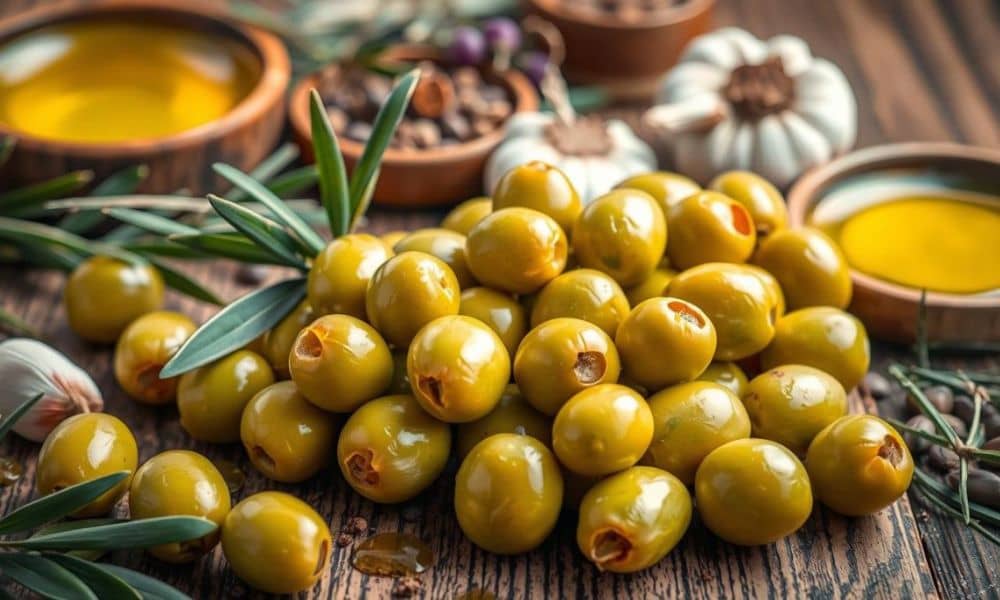The superfood world inevitably has its fair share of trends and much-hyped foods – such as avocado or kale – that draw more attention than other foods, like green olives.
Yet, green olives aren’t just tasty morsels from the Mediterranean; they are superb additions to one’s diet when trying to support heart health, as well as helping to prevent vitamin E deficiency. In a salad, as a snack, or pressed as oil, green olives offer an abundant array of good nutrition that shouldn’t be missed.
What Makes Green Olives Nutritionally Powerful?
Green olives are picked while they are still immature, which gives them a tougher texture and more bitter flavor than black olives. This flavor is interesting on its own, but green olives also have great nutritional value.
Nutritional Facts (per 100g of Green Olives):
Calories: 115
Fat: 10-11g (mostly monounsaturated fats)
Vitamin E: 3.81mg (25% of Daily Value)
Fiber: 3.2g
Sodium: 735mg (depending upon brining)
Iron: 3.3mg (18% of Daily Value)
Calcium: 88mg
Green olives are rich in antioxidants like polyphenols and flavonoids which contribute to their anti-inflammatory benefits.
How Green Olives Help Combat Vitamin E Deficiency
Vitamin E is a fat-soluble antioxidant that is very important for protecting your cells from oxidative damage. If you are deficient in this vitamin, it can cause muscle weakness, vision issues, and immunodeficiency.
Green olives are one of the best food sources of vitamin E, a nutrient many people don’t realize they are deficient in (especially for those with fat malabsorption problems or following extremely low-fat diets). Eating green olives on a daily basis (or almost every day) can help support the following:
- Cell membrane integrity
- Immune system status
- Reduced oxidative stress, which has health and anti-aging benefits
Consuming green olives with other healthy fats (like nuts or avocado) can further enhance vitamin E absorption.
Heart-Healthy Benefits of Green Olives
Green olives are fantastic for your heart health! Here’s how:
1. Monounsaturated Fats Lower LDL Cholesterol
The fats in olives can reduce bad LDL cholesterol levels, while improving HDL cholesterol, resulting in a more balanced lipid profile.
2. Antioxidant Rich
Oleuropein and hydroxytyrosol are two of the compounds that olives contain that help improve heart health through their anti-inflammatory properties, and lower inflammation, and inflammation is a big contributor to heart disease.
3. Improvements in Blood Pressure Control
Olives are brined in saltwater and are high in sodium, but the polyphenols of olives may make some improvements in vascular function and even blood pressure regulation when added to the diet in moderation.
4. Anti-Inflammatory Benefits
Chronic inflammation can be a precursor for many heart issues. Some of the antioxidants found in olives have been shown to decrease the markers of inflammation.
Other Health Benefits of Green Olives
Skin Protection: The Vitamin E in olives helps protect skin from aging and UV damage.
Bone Strength: Olives may help make bones stronger while providing calcium and polyphenols.
Weight Control: Olives provide fiber and healthy fats to keep you full.
Brain Health: Olives’ antioxidants may help lower neurodegenerative risks.
Are There Any Disadvantages?
Despite their great benefits, green olives are not for everyone. The following are some things to think about:
1. Sodium
Olives are usually cured in brine, which increases their sodium content significantly. High sodium intake has been linked to higher blood pressure, especially in those with salt sensitivity.
2. Calories
Olives are nutrient-dense, however they are also calorie-dense so portion control may be required when you are focused on weight.
3. Allergies or Sensitivities
Somepeople may be sensitive to olives or preservatives in packaging. Make sure to always read labels.
Tips for Including Green Olives in Your Diet
Toss on Salads and Bowls: For flavor and healthy fats, add sliced olives on grain or vegetable bowls.
Incorporate into Mediterranean dishes: Use them in pasta, couscous or other dishes that are Greek inspired.
Enjoy as snacks: Choose low sodium varieties or rinse before consuming.
Prepare tapenades and spreads: Blend olives with herbs, lemon juice and garlic for a heart-healthy dip.
Conclusion: A Small Fruit with Big Health Benefits
Green olives are not large, but they are great for your health. They’re full of vitamin E, healthy fats, and good antioxidants; they can help ease oxidative stress, assist with reducing the risk of heart disease, and aid in supporting your immune function.
They are full of monounsaturated fats, which will help you lower bad cholesterol levels; they contain polyphenols that can help with inflammation; so yes, they are high in sodium.
So as long as you only eat them sparingly with the high sodium levels, they can be a good adjunct with a balanced diet; because they taste delicious too! Green olives are terrific in everything from salads to spreads; so easy to eat on a daily basis.
They are a very easy way to improve your vitamin E consumption and for heart support and dietary diversity, you can’t get much better than green olives. They are perfectly delicious to have every day.
FAQs
Are green olives a healthy source of vitamin E?
Yes, green olives contain about 3.81 mg of vitamin E for 100g, which is about 25% of the amount recommended daily. They are an excellent source of this antioxidant, and in fact it’s a natural source of vitamin E.
Are green olives good for heart health?
Green olives contain monounsaturated fats, and antioxidants that help lower bad cholesterol, and reduce inflammation. This is beneficial in regard to heart health when olives are consumed in moderation.
Can green olives have negative health effects?
Yes, They can be loaded with sodium from the brining process. Eating them too often may increase blood pressure or promote water retention. Moderation is the key.
How many green olives should I eat a day?
Generally, I would suggest you enjoy a serving of 5 – 10 olives a day. That way it offers some health benefits without going crazy with calorie and sodium consumption. Remember to balance your whole diet.
Are green olives and black olives the same or one better than another?
From a nutritional view both are nutritious foods. Green olives are picked earlier, they have more of a firm texture and typically contain a bit more antioxidant, and black olives tend to have a lighter flavor.



